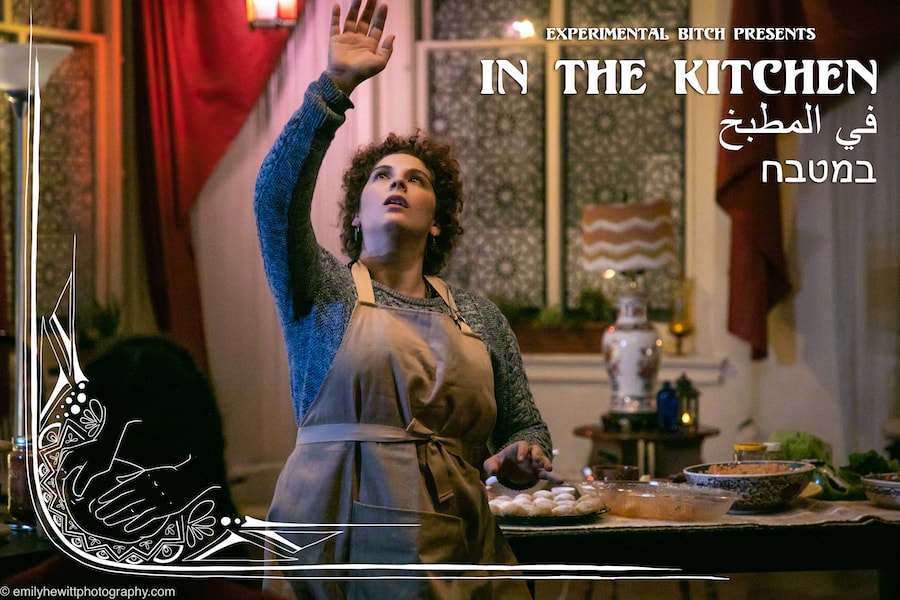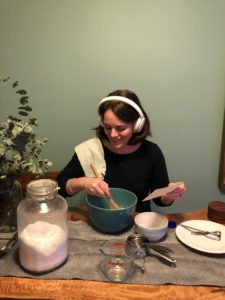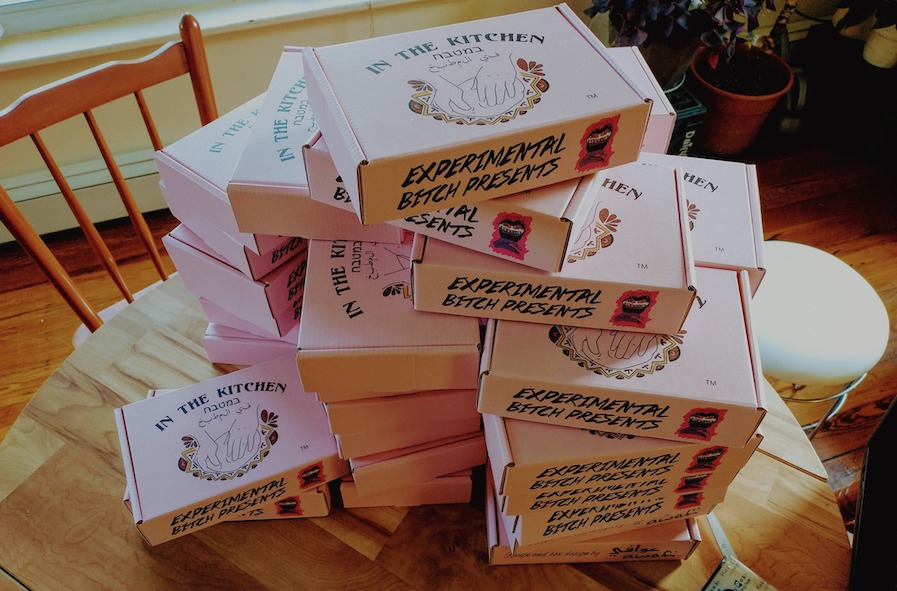A pale pink box arrived on my stoop at a fortuitous moment. I felt the definitive cancelation of Thanksgiving dinner with an unexpected pang of distress. I’ve known for months that the annual feast with more than 30 relatives wouldn’t actually happen, but I was holding onto hope that some workaround—al fresco dining, perhaps, or some kind of magic medical solution—would bring together my immediate family, most of who are in Northeastern Pennsylvania. As I descended the two floors of my apartment building to retrieve the mail, I thought about my dad’s chestnut soup and my aunt’s pumpkin pie, and the rigmarole of the extended family prepping dinner in the kitchen, spilling out onto card tables for the feast. It just wasn’t happening this year.
The mail order recipe box provided a balm for this holiday spiral. Inside was the lure of a play and the satisfaction of preparing a recipe. Under a swath of red fabric and rose petals, tiny manila envelopes held pre-measured ingredients—some I’d never used before, like hweej spice and noomi basra (dried limes) for Ba’be b’tamur, a date-filled pastry. This was In the Kitchen, a multimedia collaboration between the feminist producing company Experimental Bitch Presents and Awafi Kitchen, an Arab and Jewish cuisine catering company, and it featured an audio play with baking instructions, original music, and recorded interviews exploring Arab-Jewish womanhood across generations.
The recipe card in the box was made to appear well-worn, with water stains and a handwritten script. The time waiting for the yeast to activate and the dough to rise was filled with guided breathing meditations and songs. The writer and narrator Hannah Aliza Goldman (she/her) led the instructions (I felt like I had a personal chef in my ear, a la Ratatouille.) In the Kitchen was borne out of a trip to Morocco that Goldman took two years ago for a Jewish/Muslim interfaith conference. While there, Goldman and her father visited her grandparents’ villages, and she was commissioned to create a piece of theatre inspired by the journey for the International Human Rights Art Festival.
“I was so overwhelmed and I didn’t know how to tell my own story, because I was still in process,” says Goldman. “That’s something that I have felt—the isolation of being a woman in Sephardic community.” So Goldman reached out to other women of Jewish heritage in Arab lands to hear their own stories and experiences. “Something that was really common in all of our stories was the image of aunts and grandmothers and mothers in the kitchen, and how that was such a safe space to experience our culture and our heritage.”

In the Kitchen appeared onstage in 2018. Just before the pandemic turned the theatre industry upside down, Experimental Bitch Presents received a grant from the Brooklyn Arts Fund to stage In the Kitchen again in October. “I went through all the stages of grief and then finally I came to accept it,” says Goldman of the canceled plans. “I was like, all right, we have this money that runs out at the end of the year, we have this project.”
Inspired by mail plays and special packages from friends, Goldman decided to box up her project and offer it as an at-home experience. Director Coral Cohen (she/her) worked to reconceptualize the project as an audio play by adjusting the pacing and adding time for the recipe steps. (The piece is presented in 7 tracks, provided through a QR code on the box.) Goldman and Cohen frequently use Viewpoints and physical exercises when collaborating, neither of which worked well via Zoom. Instead, the development of the audio project took shape with writing prompts and meditation, which is a throughline throughout the play. “The idea of a meditation felt right to me because I felt like I was really needing something grounding in this time,” says Cohen.
Awafi Kitchen’s chef, Annabel Rabiyah, selected the recipe, provided art direction for the unboxing, and has been packing the boxes for shipment. Wednesday Derrico (she/her), founder and executive director of EBP, was heartened by the creative team’s enthusiasm for working in this new format.
“It felt like we were really coming together as a family even though we’re all so far apart,” she says. Creating and shipping a product was something entirely new for EBP, and they “were at the mercy of certain production elements,” concedes Derrico. The process of ordering custom boxes, for example, takes a long time. “It’s really hard to like make last-minute changes—unlike in the theatre, where you can run up onstage with the designers and change the curtain the last minute before the show opens.”

In this new iteration of the play, the audience plays an active role instead of watching Goldman bake onstage. “This version is even more effective than the stage version, which was really exciting to me,” says Cohen. “What we were really communicating with the piece was the act of cooking being a connective force generationally and culturally, and I think when the audience themselves is doing the act of cooking, they’re actually connecting in the way that Hannah was embodying in the stage version.”
Goldman has been thrilled with the process of adapting her work for audio. “It was full of unknowns and challenges and surprises, but it was really fulfilling, and I think we managed to create something that meets the moment and still carries the original spirit of the piece—albeit in new, exciting ways.”
The cutoff to order a box is today, Dec. 1, at 11:30 p.m. ET. The final shipment will be mailed in December, an arrival time that feels prescient, as many families prepare for food-centered holidays apart from each other. (Hanukkah is Dec. 10-18 this year.) It’s also fitting because the piece explores intergenerational memory and probes the feeling of longing for home. One section is a love letter of sorts to grandmothers, and asks listeners to recall images of their own grandmothers kneading and rolling in the kitchen.
While my Ba’be b’tamur baked in the oven, I was instructed to make noomi basra tea on the stovetop. My apartment filled with the smell of sweetness. A voice on the audio track made a statement that felt directed at me and my state of homesickness: “You can make home wherever you are.” The round pastries of Ba’be b’tamur, which admittedly puffed more than they were supposed to, and the hot tea were both comforts. I felt proud of my work, and In the Kitchen was there to affirm me, saying, “Look at your hands, look at what you have created.”
This artisanal care package had provided two hours of quietude inside my head, and a respite from the outside world of the kind that only the theatre can provide. And the experience prompted a Thanksgiving workaround after all: My family shared recipe cards and gathered in the kitchen, albeit virtually, to prepare our dinner.
Allison Considine (she/her) is senior editor of American Theatre. aconsidine@tcg.org
In the Kitchen is directed and devised by Coral Cohen; written, created, and performed by Hannah Aliza Goldman; culinary partner and art director is Annabel Rabiyah of Awafi Kitchen; sound design by Carsen Joenk; original compositions and traditional musical curation by Anat Halevy Hochberg; audio engineer is Enat Ventura; production stage manager is Rachel April; produced by Tatiana Baccari and Wednesday Derrico of Experimental Bitch Presents.


